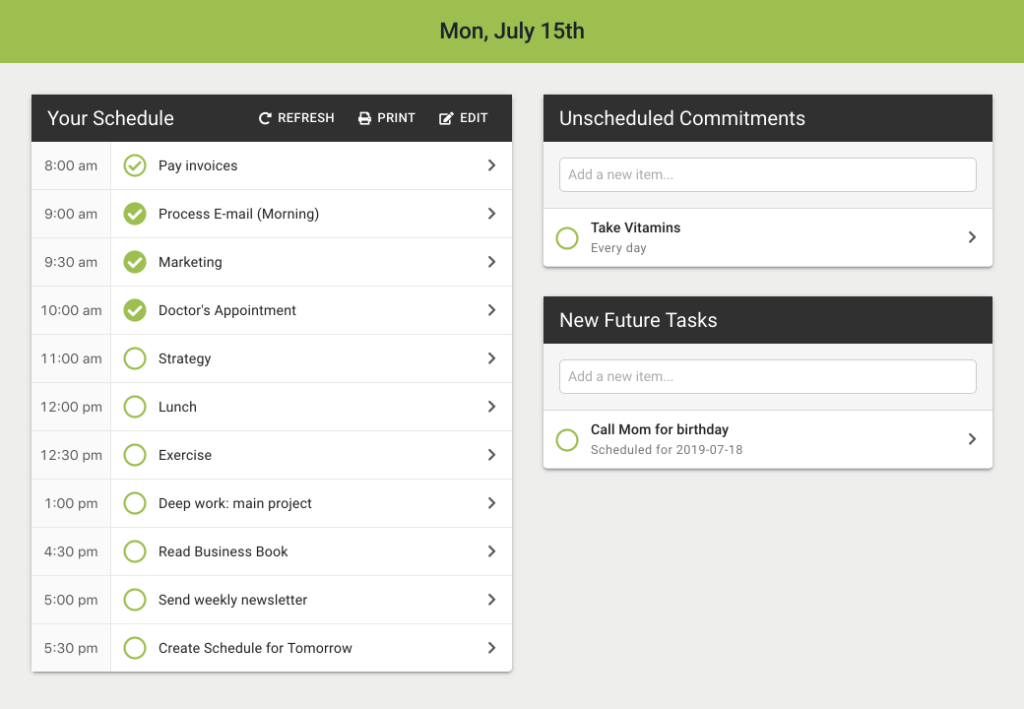Tasks and activities come in different shapes and forms. We must understand how much time to spend on each of them for better management of our days.
What happens when we are faced with a new task, for example? How do we know how much time to spend on it for a successful outcome? What strategy should be use to plan our time?
You probably already know about time estimation, but have you ever heard of time allocation?
Time Estimation vs Time Allocation
Time estimation is figuring out how long a task will take to finish, while time allocation is figuring out how much time to spend on it today or this week.
While estimating time can be a useful strategy for tasks that you do regularly and have few unknowns, allocating time helps you more effectively handle tasks that are new, complex or have a large number of unknowns.
Let’s dive into the differences between time estimation and time allocation so you can confidently plan your day going forward.
“We don’t know what we don’t know”
When time allocation comes into play we usually think of tasks that are new to us. How often do you have a task on your to-do list for which you estimate 1 hour until completion and instead spend 3 hours working on it?
Don’t feel bad about it! You’re not alone.
It’s normal for us to underestimate the amount of time required to wrap up a new task. It ends up taking 2, 3 or 10 times more than we initially thought. The problem is that it’s hard to estimate the time for a task that we’ve never done before.
How do we solve this?
Shift your time management focus from estimating your time to allocating it. This helps you move from an “accomplishment” mindset to a “progress” mindset—the irony being that if you focus on making progress, you’ll often accomplish more than if you focus on accomplishment itself.
Make sure you allocate enough time
Ask yourself: Can I make sure I am allocating enough time to this task regularly to move the task forward?
Why is this important, you ask?
Since you are dealing with a new task, estimating the amount of time it will take for you to complete it might not give you the right answer. New tasks have a lot of unknowns that often make them take longer than you expect.
And, of course, things always come up each in your life daily—things that are not planned and which end up “stealing” the time from the tasks you need to complete.
By allocating time instead of estimating it, you ensure you continue to make progress on your priorities until they are done.
The secret recipe of successful people
Whether we like it or not, we all have 24 hours in a day. It’s how we manage our time that dictates our progress and helps us shape our future.
How many times have you seen successful people in interviews talking about how much they get done, yet seeming so relaxed? Do they have a secret recipe that no one else knows? Are they more than human?
Of course not! They merely have a better grasp at successfully allocating time for each task and activity on their to-do list. They have built a system that allows them to be productive. Consistently.
Going back to the 24 hours in a day—the same 24 hours that these successful people have just like the rest of us—the question that inevitably comes up is:
How do we make the most of it?
Let’s say we sleep for 8 hours. We are now left with 16 hours to “spend”. How do we spend them wisely?
Become a better “time investor”
Start by investing your time, not spending it. Make the effort to plan how you will spend your time, so you spend it wisely—and ensure you keep making progress on your multiple competing priorities.
An easy way to think about this is by comparing it to the stock market.
Warren Buffet’s advice for investors has always been “Don’t put all your eggs in one basket”. What does the famous investor mean by this?
Well, when investing it’s best to diversify your portfolio and not pour all your hard-earned money into one single stock. Performance comes from diversification.
The same goes for your daily tasks. If you don’t “invest” your time wisely, ensuring you are addressing the important items on your task list and not just the urgent ones, you’ll end up regretting your choices.
What’s the moral behind all this?
Make a conscious choice about how to spend your time, or risk sacrificing your health and what you want to achieve in life. It sure works a lot better than starting those 16 hours with no plan whatsoever.
Do this for better results
There are a couple of things you can do to make your life easier:
- Accept You Are Human
You should give yourself the grace to say that there are going to be a lot of unknowns.
- Focus on Making Progress
Assign a couple of hours every day and start chipping away at your high priority tasks instead of leaving everything until the last minute.
- Explore Your Uncertainties
Try to figure out at the beginning what the uncertainties could be, so you can comfortably estimate the time further along the line.
Summary
Our days seem to get busier and busier as we make progress and we ask more from ourselves. We want to do more with our lives and we realize the 24 hours in a day slip away fast. Should we go into panic mode and forget about our goals? Not at all.
What we should aim for is a better understanding of how powerful time estimation and allocation are for our success. We should learn to harness their power and use them for our benefit.
It’s always easier to throw in the towel than push ourselves to learn something new and change our routine. But I dare you to learn the movements and become better at it. Time allocation can be that underrated skill in your arsenal that takes you to victory.








